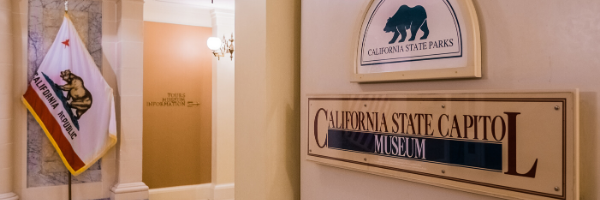In this Issue:
- The Mission Continues
- California’s Legislative Process Put on Hold
- State Budget Advocacy Amidst the Crisis
- The CARES Act: What California Community Colleges Need to Know
- April is Community College Month
- A Conversation with Policymakers and Practitioners on African American Student Success
- Join Us for our Next Webinar: Tuesday, April 21
- Federal Grant Opportunities
- Upcoming Events
The Mission Continues
By Larry Galizio, Ph.D.
President and CEO, Community College League of California
Just as our districts and colleges are adapting to the extraordinary challenges of the moment, so too is the Community College League of California.
Advocating for Our Members
Our Government Relations Team has taken the lead in organizing California community college advocacy partners, including faculty, administrative groups, and district lobbyists to share information and create unified messaging during this critical time. Additionally, we continue meeting with committee consultants, the Department of Finance, the Legislative Analyst’s Office, and members of the State Legislature and Executive Branch. This is especially important considering the fluidity of federal and state government activity.
Information Sharing
One of the League’s most important roles is that of statewide convener. In addition to Government Relations Webinars, our Educational Services and Leadership Development Team has organized weekly CEO and Trustee webinars. The webinar for CEOs is held Tuesdays from 12:00 – 1:00 p.m., and the weekly Trustee webinar is held Thursdays from 12:00 – 1:30 p.m. For webinar recordings, PowerPoint presentations, and other materials discussed during the weekly webinars, email League staff at cclc@ccleague.org. We are grateful for the exemplary leadership demonstrated by CEOCCC Board President Joe Wyse and CCCT Board President Linda Wah.
District Services
Our District Services Unit recently conducted a webinar on the League’s Tax and Revenue Anticipation Note Program. The TRANs Program takes advantage of the League’s California Community College Financing Authority status and can serve as a cash management tool for districts with cash flow deficits. Additionally, our Library Services, Policies and Procedures, BoardDocs, and many other programs continue apace. For more information please contact Lisa Mealoy at lmealoy@ccleague.org.
Collaborative Efforts
We collaborated with the Chancellor’s Office in advocating for federal stimulus that would serve our membership. This included employing our Phone2Action Tool which generated easy-to-use advocacy communication to federal elected officials supporting inclusion of flexible resources for higher education as part of the federal fiscal stimulus.
Finally, please do not hesitate to contact me or anyone on League Staff with requests, information, and ideas for how we might better serve our 73 member districts. It is with tremendous pride that we do this work, and we are inspired by your exceptional efforts to support California’s more than two million community college students and the communities within your respective districts.
California’s Legislative Process Put on Hold
Leaders of the California State Legislature announced they will extend the legislative recess to May 4 due to health concerns related to the Coronavirus (COVID-19) pandemic. Lawmakers originally planned to return to Sacramento to resume work on April 13, however as the number of COVID-19 infections continue to rise they have decided to postpone meeting in order to practice social distancing to slow down the spread of the virus.
As a result of the shortened legislative session, California state legislators are being asked to prioritize legislation and rethink the bills they are promoting. We do not know to what extent, but legislators will likely need to significantly cut down on the number of bills they push forward this year. Once League staff has a full understanding of how this will impact the current legislative session, we will notify districts and colleges.
Most legislative deadlines are at the discretion of the State Legislature. Thus, the regular legislative deadlines for the passage of bills by dates laid out in the legislative calendar will likely not apply to legislation this year. As of Friday, April 3rd, state leaders have pledged to follow the planned deadlines, but the extended recess has made this doubtful.
Another question is whether or not the legislature can meet virtually. While Governor Newsom created an executive order authorizing local governments and statewide boards or commissions to meet virtually, this does not apply to the State Legislature. The meeting requirements for the legislature are embedded in the state’s constitution, so there is some question as to whether or not they can move their in-person committee hearings or floor votes online. The concern is that they would open it up to any group to challenge the validity of bills passed via a virtual vote.
Many questions remain in regard to how the legislative process will move forward. The League is working with our colleges, legislative staff, and policymakers to identify next steps. We will work to ensure that the field is notified of any developments going forward.
State Budget Advocacy Amidst the Crisis
Before breaking for recess, the California State Legislature approved an emergency aid package of up to $1.1 billion for public health and K-12 schools. While community college districts are concerned about the fiscal impacts of COVID-19, it should be noted that we still do not yet have hard numbers and cannot speculate how the State Budget will be affected. That said, the state’s reserves include an account specifically for K-12 and community colleges, which puts us in a better position than in the last decade to withstand an economic downturn.
The League’s Revised Messaging
Pursuant to a Department of Finance memo on March 24th, all state departments and agencies are expected to anticipate a “workload budget,” whose essence is a continuation of the current year allocations with specified adjustments for caseload, COLA, and others as defined in Government Code Section 13308.05. Once the state has collected its taxes, there may be new instructions for better or worse depending on what the numbers show.
In this environment, the League has revised its advocacy message to the State Legislature and Administration, emphasizing the need for the state to fund districts’ operating expenses and extraordinary costs associated with COVID-19. To properly manage both the crisis and recovery, districts need stability, predictability, and flexibility.
As part of this effort, the League is seeking assurance of the statutory 10.93% Proposition 98 split, guaranteed backfill of property tax and student fee revenue, two-year extension of the Hold Harmless provision in the funding formula, deferral of the increased district-share of pension obligation, and continuation of Proposition 51 bond-funded capital outlay projects. Moreover, the League is advancing the call for both regulatory and statutory relief in a number of areas, including but not limited to, the Faculty Obligation Number.
Even if additional resources are not immediately available for financial aid reform, the League continues to advocate for a statutory structural reform consistent with the California Student Aid Commission’s proposal to modernize Cal Grants on a total cost of attendance basis. This policy change is long overdue and could be funded at a later time when revenues recover.
Advocating in the Virtual Space
Through phone, video, and email, the League continues to engage with legislative staff in the Assembly, Senate, Department of Finance, and Legislative Analyst’s Office. In particular, we are relaying the heroic efforts of our districts to continue educating our students through remote technology. Beyond direct lobbying, we are also convening other community college stakeholders to discuss common messaging and group advocacy. In the past decade, the League was the central address for coalition work during both economic downturns, and we have quickly resumed that role.
Moving Forward
Although the Legislature still must comply with its June 15th constitutional deadline to approve a budget, there is a strong possibility that the process will extend into August if not beyond. This means that whatever is passed in June could be altered in the successive months depending on how the numbers look. Our immediate task is to continue communicating with legislative offices, relaying the stories of what our districts are doing, and gathering information on how the state can weather the storm.
Through all this, we continually remind decision makers and their staff that community colleges educate and train the workers on the frontline of this crisis, including, but not limited to nurses, respiratory therapists, and other public safety officials. More importantly, our institutions have the capacity to educate those displaced by the crisis as long as we are funded to do so. When legislative hearings resume, we anticipate calling on you for critical grassroots lobbying. League staff will provide opportunities for advocacy in the coming weeks.

The CARES Act: What California Community Colleges Need to Know
(Originally published in the League's Blog)
Last week Congress passed, and President Trump signed into law, the Coronavirus Aid, Relief and Economic Security (CARES) Act, a $2.2 trillion stimulus package intended to alleviate economic distress during the current Coronavirus pandemic and economic downturn. It is the largest stimulus package ever passed and it is worth roughly 10% of the United State’s GDP.
The stimulus package primarily focuses on increasing unemployment benefits, providing direct aid to individuals, and granting loans to distressed businesses. The appropriation touches on nearly every sector of the economy, including higher education. The legislation will provide roughly $14 billion for colleges and our students and provides some regulatory relief.
It should be noted that higher education advocates do not believe that this level of funding will be enough to adequately support our institutions and students during this time of crisis. Community college advocates should expect to be ready to advocate for a fourth round of a stimulus package that will include an increased level of funding so our colleges can continue to educate our students.
Below is a breakdown of parts of the federal stimulus package that are of interest to California Community Colleges. For questions, please do not hesitate to contact the League’s Acting Director of Government Relations, Ryan McElhinney, at ryan@ccleague.org.
Major Items: $2.2 Trillion in Overall Funding
- $500 billion in direct payments to individuals, up to $1,200 for persons making less than $75, 000. Will provide an additional $500 per child.
- $367 billion in forgivable bridge loans to small businesses.
- $250 billion expansion of Unemployment Insurance:
- Expands maximum unemployment benefit by $600 a week for four months.
- Extends the ability to qualify for unemployment benefits for gig workers, freelancers and furloughed workers.
- Extend benefits by 13 weeks.
- $150 billion to hospitals.
- $150 billion for state and local governments.
- $500 billion in loans to distressed companies
Education Funding: $30 Billion Overall for Education
- $13.5 billion for K-12.
- $3 billion for Governors to distribute with wide latitude on how they can use these funds.
- $14.25 billion for Higher Education.
Higher Education Funding: Breakdown of $14.25 Billion
- Funding would go out to colleges based on a formula consisting of 75% number of Pell FTES and 25% FTES.
- Minority Serving Institutions will have $1 billion reserved for them.
- Will likely result in larger grants for those colleges.
- At least half of the funding would be required to be spent on direct emergency aid to students.
- Roughly $7 billion for students, $7 billion for institutions.
- $300 million would go out in grants to colleges deeply impacted by the Coronavirus.
Regulatory Relief: More Flexibility When Delivering Financial Aid
- Waiving institutional match requirements for Federal Work Study (FWS) and Supplemental Education Opportunity Grants (SEOG)
- Allows colleges to pay students via federal work study who are unable to attend school.
- Permits colleges to transfer FWS funds to SEOG.
- Colleges and students will not be liable for financial aid dollars under Return of Title IV provisions if a student is forced to withdraw due Coronavirus.
April is Community College Month
Did you know April is Community College Month? This month presents a great opportunity for our colleges and districts to share why community colleges matter, how your college is serving your community's needs, and why public support for our colleges is more important now than ever. Our partners at ACCT have developed a toolkit designed to help you make the most of #CCMonth.
California Community Colleges are being challenged right now like never before, serving as vital lifelines to help their communities meet basic food and housing needs, as well as providing healthcare assistance and medical equipment to local hospitals and relief efforts.
Community College Month is your opportunity to demonstrate the vital importance of your college and to make an undeniable case for why your college deserves continued public support and funding. ACCT's toolkit includes information to help you make this case.
We hope you will join this campaign and demonstrate why California Community Colleges matter!
Download the Toolkit
A Conversation with Policymakers and Practitioners
on African American Student Success
Virtual Townhall
Wednesday, April 22nd
3:00 p.m. - 4:30p.m.
Nearly two-thirds of all African American undergraduate students in the state attend a California Community College; however a lack of resources prevents Black students from achieving student success and hinders practitioners from closing the equity gap. Join state policymakers, California community college practitioners, and national scholars for a virtual town hall to discuss financial aid reform, housing, food, technology and transportation insecurities, impacts of COVID-19 on African American students, and policy recommendations to support this student population.
Register Here

Join Us for our Next Webinar: Tuesday, April 21 at 11:00 a.m.
Join the League's Government Relations Team for our monthly webinars. Receive important information regarding legislation and proposals discussed in Sacramento and Washington, D.C. that will impact you, your students, and your institution.
Schedule
Every Third Tuesday of the Month, 11:00 a.m. – 12:00 p.m.
Webinar Details
Telephone Number: (646) 876-9923 or (669) 900-6833
Meeting ID: 623 780 059
Registration
Be sure to register in advance for this meeting. After registering, you will receive a confirmation email with information about joining the webinar.
2020 Webinar Schedule:
Tuesday, April 21
Tuesday, May 19
Tuesday, June 16
Tuesday, July 21
Tuesday, August 18
Tuesday, September 15
Tuesday, October 20
Tuesday, November 17
Federal Grant Opportunities
Presented by Downs Government Affairs
The League, in partnership with Downs Government Affairs, provides a list of federal grants to assist your community college in improving its programs and services. If you have any questions about the following grants, please feel free to reach out to Thomas Downs at TCDowns@downsgovaffairs.com.
For a full list of federal grants available to community colleges, visit our Federal Grants page at www.ccleague.org/federal-grant-opportunites
Upcoming Events
Please note the following events have been canceled or rescheduled:
2020 CCPRO Conference
Canceled: April 15-17, 2020
Annual Trustees Conference
Canceled: May 1-3, 2020
NOTE: The CCCT Business Meeting will be rescheduled.
Vision for Success Summit
Rescheduled: Nov. 9-10, 2020
For more information, contact the League's Government Relations and Communications staff:
Ryan McElhinney, Acting Government Relations Director | ryan@ccleague.org
Laura Murrell, Communications Manager | laura@ccleague.org
Rina Kasim, Member Resources Associate | rina@ccleague.org
Gerson Liahut-Sanchez, Government Relations & Communications Fellow | fellow@ccleague.org
Follow League Tracked Bills at: www.ccleague.org/advocacy/bill-tracking
For news related to the State Budget and Policy visit: www.ccleague.org/advocacy













